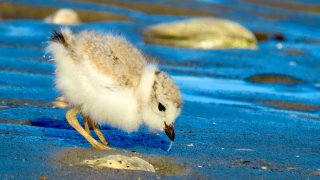
Chicagoans have eagerly watched a pair of piping plovers successfully breed at Montrose Beach in recent years, but another sighting has thrilled birdwatchers across the city this week.
The sighting occurred at Rainbow Beach on the city’s South Side earlier in the week. A 5-year-old female, who usually nests at Sleeping Dunes National Lakeshore in Michigan, was spotted on Tuesday by birdwatchers at the site.
Experts were able to use photographs to identify the bird, who was believed to be stopping in Chicago to rest and refuel on her way up to Michigan.
In fact, the bird was already reported to be back at her usual nesting site at the lakeshore on Wednesday, making the trip overnight.
Feeling out of the loop? We'll catch you up on the Chicago news you need to know. Sign up for the weekly Chicago Catch-Up newsletter here.
Not to be outdone, Monty, one of the famous pair of piping plovers that have called Montrose Beach home in recent years, was spotted by observers on Thursday.
Monty and Rose are one of an estimated 75 pairs of piping plovers that are currently living in the Great Lakes region. The highly-endangered birds have thrilled birdwatchers for years, and have prompted officials to take steps to protect them ever since.
The return of Monty, as well as the rest stop made by the piping plover at Rainbow Beach, has encouraged wildlife experts that there could be additional places for the birds to rest, and to potentially breed, in the city.
Local
“We’ve had experts come and look at Rainbow Beach before, and they said it has the potential to be a suitable habitat,” wildlife expert Armand Cann said. “Her showing up means there’s potentially a place for her to rest and be able to feed herself. All are very important for piping plovers.”
Cann urged residents to take steps to protect the birds, who are sensitive to noise and other factors. Once the breeding birds start to arrive, residents are urged to treat breeding areas with respect, and to keep a respectful distance.



